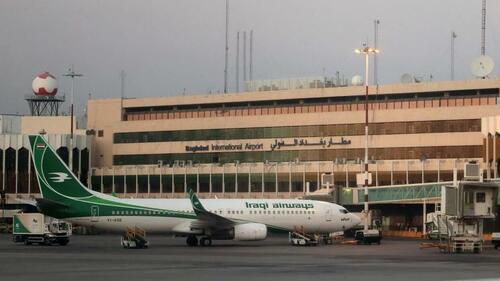The US embassy’s logistical support center at Baghdad International Airport came under attack late Tuesday. "The shelling, the nature of which has not yet been determined, whether by missiles or mortar shells, took place near the US embassy’s logistical support headquarters at Baghdad airport," an Iraqi security source told Sputnik. He added, "There is no information about human losses so far."
"The strike, which may have involved rockets or mortars, also impacted areas near the headquarters of the Anti-Terrorism Agency," a security source told Shafaq news agency on Wednesday.
Tuesday’s attack on the logistical center at Baghdad airport came hours before Iranian President Masoud Pezeshkian’s visit to Iraq. Later on Wednesday Pezeshkian met with Iraqi Prime Minister Mohammed Shia al-Sudani and Iraqi President Abdul Latif Rashid.
 Image source: Sputnik/dpa/picture alliance
Image source: Sputnik/dpa/picture allianceA spokesperson for the Kataib Hezbollah resistance faction, Jaafar al-Husseini, described the attack’s timing as "suspicious."
"Those behind the attack on Baghdad airport at this particular time have suspicious motives. The aim is to disrupt the visit of the Iranian president to Baghdad," Husseini said, calling on Iraqi security forces to "expose those responsible."
Iraqi resistance factions banded together after the start of the war in Gaza in October, forming a coalition dubbed the Islamic Resistance in Iraq (IRI). These groups started carrying out drone and rocket attacks on US bases in Iraq and Syria, both in solidarity with the Palestinian resistance and to pressure US forces present in Iraq.
The Iraqi operations were officially halted in January after a drone attack killed three US soldiers on the Jordan–Syria border.
This followed intensive pressure from the Iraqi government, which over the past two years has been involved in a diplomatic effort with Washington, said to be aimed at a withdrawal of US forces from the country. Iran also reportedly played a role in pressuring the Iraqi resistance to de-escalate.
However, as the war in Gaza continues to rage and as troop withdrawal talks between Baghdad and Washington continue to stall, these attacks have witnessed a gradual and unofficial resumption in recent months.
A drone attack on the Kharab al-Jir base in northeastern Syria injured several US and coalition personnel on August 10th. US bases in Iraq and Syria also witnessed a few attacks in late July.
Iran's President Pezeshkian visits Iraq on his first foreign trip. His three-day trip will include visits to several cities that represent Iran’s political, religious, economic and security interests in Iraq. w/ @Alissanyt https://t.co/wpdzmHXBEK
— Farnaz Fassihi (@farnazfassihi) September 11, 2024
Washington has shown no intention of withdrawing its forces from Iraq. The negotiations themselves have not touched on an actual pullout of US forces but instead an end to the combat role of the US coalition operating in Iraq. This would see their presence transition into an advisory one, and US forces would remain in Iraq to coordinate with Baghdad on "security" matters.
Reuters reported on Saturday, citing sources, that Baghdad and Washington have agreed on a late 2026 deadline for US troop withdrawal. The Cradle’s Iraq correspondent rejected the report as untrue.
Source link

